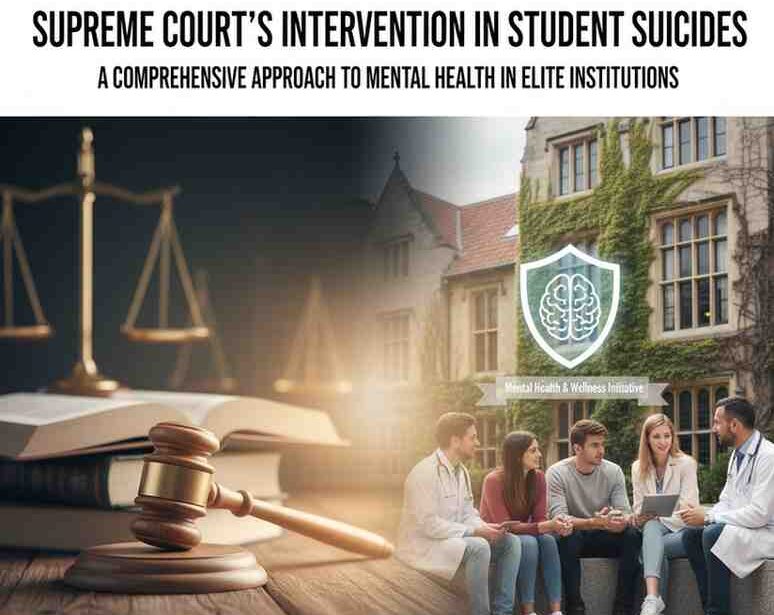The Supreme Court of India takes decisive action to address rising student suicides in IITs and IIMs, implementing mental health reforms, counseling initiatives, and institutional accountability measures to create safer, supportive academic environments.
Supreme Court’s Intervention in Student Suicides: A Comprehensive Approach to Mental Health in Elite Institutions
Between 2018 and 2025, over 98 students from India’s premier institutions, including IITs and IIMs, tragically died by suicide. This alarming trend has prompted the Supreme Court of India to take decisive action, emphasizing the need for comprehensive reforms in student welfare and mental health support.
Formation of the National Task Force
In response to these incidents, the Supreme Court established the National Task Force Against Student Suicides in March 2025. Chaired by former Supreme Court judge Justice S. Ravindra Bhat, the task force comprises experts in psychiatry, clinical psychology, and education. Its mandate includes:
- Identifying Root Causes: Investigating factors such as academic pressure, caste-based discrimination, gender bias, and mental health stigma.
- Policy Review: Assessing existing student welfare and mental health policies to identify gaps and inefficiencies.
- Legal Reforms: Recommending amendments to strengthen protections under relevant laws, including the SC/ST (Prevention of Atrocities) Act.
- Institutional Inspections: Conducting surprise visits to universities to evaluate student support mechanisms.
- National Action Plan: Developing a framework for the mandatory inclusion of mental health services in all higher education institutions.
Supreme Court’s Guidelines for Educational Institutions
On July 25, 2025, the Supreme Court issued binding guidelines for all educational institutions, including schools, colleges, and coaching centers. These guidelines mandate:
- Mental Health Policy: Institutions must adopt and implement a uniform mental health policy, drawing from existing national frameworks.
- Counselor Appointment: Institutions with 100 or more students must appoint at least one qualified counselor or psychologist.
- Support Systems: Establishing written protocols for immediate referral to mental health services and displaying suicide prevention helpline numbers prominently.
Institutional Accountability
Despite these directives, many institutions have been slow to implement the recommended changes. As of October 2025, over 57,000 institutes have yet to participate in the National Task Force’s survey on student suicides. The Supreme Court has expressed its disappointment and warned of potential legal actions if institutions fail to cooperate.
Case Study: IIT Kharagpur
IIT Kharagpur has taken proactive steps to address student suicides, including:
- Infrastructure Changes: Removing ceiling fans from hostel rooms to deter impulsive self-harm methods.
- Mental Health Support: Appointing a full-time psychiatrist and forming a student-led task force to identify and address mental health challenges.
- Technological Initiatives: Launching the “Setu” app, an AI-powered platform that allows students to anonymously report emotional distress and access support services.
- Community Engagement: Introducing the “Campus Mothers” program, where faculty and staff spouses provide emotional support to students.
These initiatives aim to create a supportive environment that prioritizes student well-being.
Frequently Asked Questions (FAQ)
What prompted the Supreme Court’s intervention in student suicides?
The rising number of student suicides in premier institutions like IITs and IIMs, with over 98 cases reported between 2018 and 2025, led the Supreme Court to take action.
What are the key objectives of the National Task Force?
The task force aims to identify the root causes of student suicides, review existing policies, recommend legal reforms, conduct institutional inspections, and develop a national action plan for mental health services in higher education institutions.
What guidelines has the Supreme Court issued for educational institutions?
The Supreme Court has mandated that all educational institutions adopt a uniform mental health policy, appoint qualified counselors, establish support systems, and display suicide prevention helpline numbers prominently.
What steps has IIT Kharagpur taken to address student suicides?
IIT Kharagpur has removed ceiling fans from hostel rooms, appointed a full-time psychiatrist, launched the “Setu” app, and introduced the “Campus Mothers” program to provide emotional support to students.

























